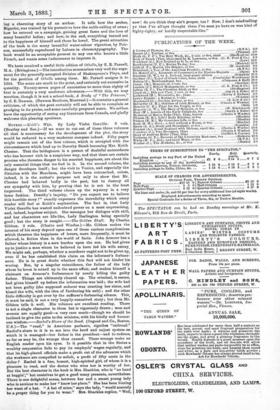• Gibbon tells it well. His volumes are excellent reading.
There is not a single character in them but is vigorously drawn ; men and women are equAlly good—a very rare merit—though we should be inclined to give the palm to the minister, with his kindly and humor- ous wisdom.—Rachel's Share of the Road. (Osgood and Co., Boston, U.S.)—The "road," in American parlance, signifies "railroad." Rachel's share in it is to see into the hard and unjust system on which it is managed—her father is the president—and to redress, as far as may be, the wrongs thus caused. These wrongs make an English reader open his eyes. Is it possible that in the States a wealthy corporation fails to pay its employes' wages regularly, and that its high-placed officials make a profit out of the advances which the workmen are compelled to solicit, a profit of fifty cents in the dollar ? Rachel is a fine, honest, high-spirited girl, of whom it is a pleasure to read, and the doctor who wins her is worthy of her. But the best character in the book is Mrs. Shackles, who is "no hand at beggin'," bat contrives to get a good many presents, nevertheless. There is one delightful scene, between her and a smart young lady who is anxious to make her " know her place." She has been hinting her want of a hat. "A hat of mine," says the lady, "would scarcely be a proper thing for you to wear." Mrs. Shackles replies, " Well,
now ! do you think they ain't proper, too ? Now, I don't mind telling ye that I've all'ays thought them I've seen ye have on was kind of flighty-tights-, an' hardly respectable-like."


































 Previous page
Previous page